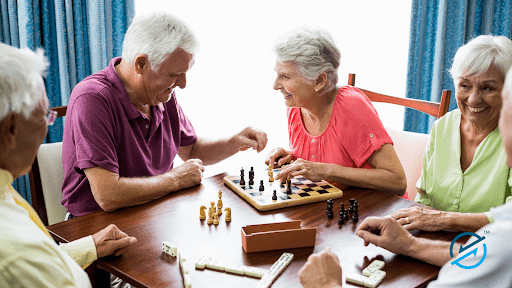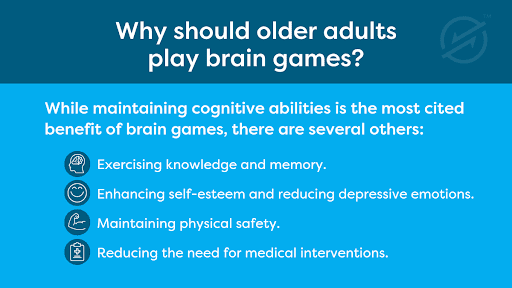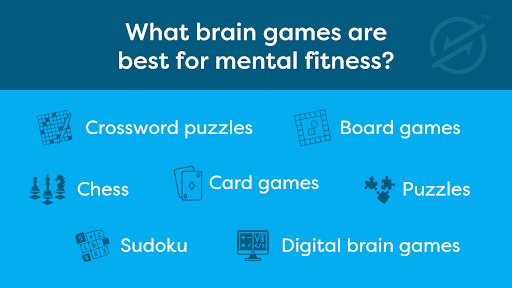
If you start your day by mulling over a crossword puzzle as you enjoy a cup of coffee, or you wind down in the evening with Sudoku or solitaire, you’re one of many people who are working on your “mental fitness,” maintaining mental dexterity to “reap the benefits of a sharper mind and a healthier body for years to come.”
We play brain games because they’re fun. Our brains enjoy the challenge of seeking patterns and solving problems, so we entertain them with word searches, riddles, board games, chess, trivia, and a variety of other games that test our knowledge and memory.
Even better, these entertaining activities have various benefits for older adults. They promote cognitive health and delay mental decline, enhance memory, reduce the risk of dementia, and even boost general self-confidence and well-being. Providing these kinds of puzzles and games to adults in senior living communities can have a positive impact on all residents.
Why should older adults play brain games?
In the article “Physical Activity and Cognitive Decline Among Older Adults”, published in JAMA, researchers Paula Iso-Markku et al. noted that participating in cognitive activities such as brain games is associated with a lower risk of cognitive decline in older adults. Maintaining healthy cognitive functioning in older adults is essential for helping them maintain independence, preserve quality of life, ensure physical safety, and reduce the need for medical services and long-term care.
While maintaining cognitive abilities is the most cited benefit of brain games, there are several others:
- Exercising knowledge and memory. Many brain games like trivia and crossword puzzles draw on cultural knowledge such as history, geography, the arts, sports, government, and more. Just like physical exercise strengthens muscles, mental exercise strengthens the connections between neurons. This improves memory retention and recall.
- Enhancing self-esteem and reducing depressive emotions. You know that feeling when you find the last word in the word search or declare “Checkmate!” to your opponent? That sense of accomplishment can boost older adults’ moods and self-esteem. Additionally, in “Trajectories of Cognitive Decline and Social Relations,” Béland et al. found that older adults who socially engaged with others through activities such as brain games tended to be emotionally healthier than their peers who did not.
- Maintaining physical safety. This may seem like an odd benefit to attribute to brain games, but research supports it: older adults who are cognitively impaired are more susceptible to accidents and injuries. This is particularly true when older adults are engaging in tasks requiring attention and awareness, such as cooking on the stove, driving, and climbing stairs. By maintaining strong cognitive abilities, older adults are able to retain their independence for longer by maintaining safety.
- Reducing the need for medical interventions. When older adults begin to experience cognitive decline, they become increasingly dependent on caregivers, often leading to the need for long-term care services or even hospitalization. Ken Covinsky, a physician and researcher at the University of California, San Francisco division of geriatrics, says, “The older you are, the worse the hospital is for you.” Edgar Pierluissi, the medical director of the ACE (Acute Care for Elders) unit at San Francisco General, adds, “Bed rest is really, really bad [for older hospitalized patients]. It sets off an explosive chain of events that are very detrimental to people’s health.” By preserving cognitive health, older adults can delay or reduce the need for interactions with the healthcare system.

What brain games are best for mental fitness?
There’s no “best” brain game, but there is one important rule: variety. Just as a well-rounded workout routine mixes cardio with strength training and rest, a brain game routine should be equally balanced. Some brain games that are both enjoyable and beneficial include:
- Crossword puzzles. Perhaps the first thing we think of when we hear the phrase “brain game,” crossword puzzles help maintain a well-developed vocabulary, exercise language skills, and prompt memory.
- Chess. A classic board game that relies on strategy and foresight, chess is an excellent brain workout.
- Sudoku. One of the best games for practicing logical reasoning, Sudoku come in a variety of difficulty levels to suit every participant.
- Puzzles. Jigsaw puzzles exercise visual and spatial reasoning and draw upon short-term memory.
- Card games. Multiplayer games provide social interaction and engagement and often ask the brain to tap into short-term memories, pattern recognition, and strategic thinking.
- Board games. Just like card games, board games require multiple players and therefore establish a social environment. Games such as Monopoly, Life, and Risk also require strategy and forethought.
- Digital brain games. Many websites and apps are specifically built to challenge cognitive skills. Check out Lumosity, BrainHQ, and others.

Providing brain games for residents in senior living communities
Not every resident may jump for joy at the thought of dedicating some time in their day to brain games. Fortunately, there are some effective strategies community activity directors can use to increase engagement:
- Structured programs. Publications such as News Currents Sr. are designed for use in structured group environments. A weekly current events resource, News Currents Sr. includes cognitively challenging activities such as a “Where in the World?” geography challenge, word scrambles, and word searches that exercise short-term memory recall, language skills, and vocabulary. Discussion questions prompt social interaction and lively conversation, fostering feelings of connection, community, and self-confidence.
- Technology. If possible, provide access to tablets or computers with brain games downloaded or installed. Make sure that there’s strong and reliable internet access in both common areas and individual rooms so residents may use online brain game resources at their convenience.
- Social sessions. Organize group gatherings for activities such as bingo, trivia, or card games. You may even consider hosting competitions or tournaments with small prizes to motivate participation.
- Staff buy-in. Thoroughly train your staff on the benefits of brain games so they know the rationale for emphasizing cognitive engagement. Staff can even join in on the games with residents.
- Daily routine. Set aside time for brain games in the community’s daily schedule. Offer structured sessions as well as opportunities for individual time for residents to play brain games when the mood strikes.
Mental agility matters
Brain games come with a wealth of benefits that go far beyond entertainment. These activities are excellent tools for maintaining cognitive functions such as memory, logic, attention, strategy, and language skills. They can also foster social interactions and reduce feelings of loneliness and depression. By making brain games a regular part of their day, older adults can stay sharper, longer–a satisfying outcome for all.